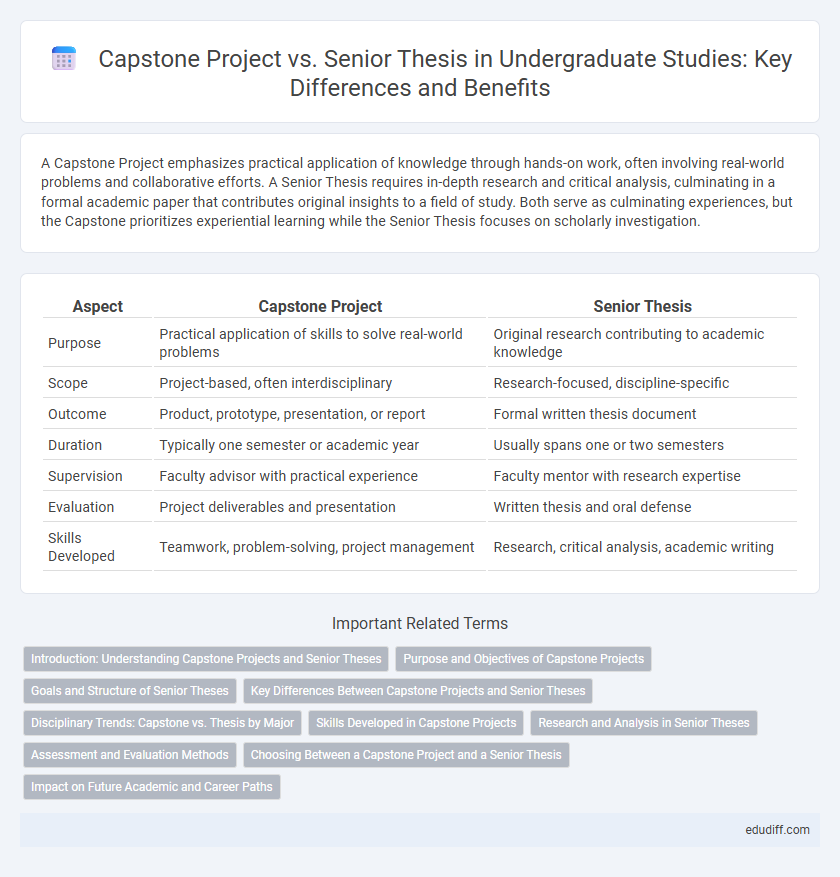A Capstone Project emphasizes practical application of knowledge through hands-on work, often involving real-world problems and collaborative efforts. A Senior Thesis requires in-depth research and critical analysis, culminating in a formal academic paper that contributes original insights to a field of study. Both serve as culminating experiences, but the Capstone prioritizes experiential learning while the Senior Thesis focuses on scholarly investigation.
Table of Comparison
| Aspect | Capstone Project | Senior Thesis |
|---|---|---|
| Purpose | Practical application of skills to solve real-world problems | Original research contributing to academic knowledge |
| Scope | Project-based, often interdisciplinary | Research-focused, discipline-specific |
| Outcome | Product, prototype, presentation, or report | Formal written thesis document |
| Duration | Typically one semester or academic year | Usually spans one or two semesters |
| Supervision | Faculty advisor with practical experience | Faculty mentor with research expertise |
| Evaluation | Project deliverables and presentation | Written thesis and oral defense |
| Skills Developed | Teamwork, problem-solving, project management | Research, critical analysis, academic writing |
Introduction: Understanding Capstone Projects and Senior Theses
Capstone projects and senior theses represent culminating academic experiences that showcase undergraduate students' mastery of their discipline through practical application or research. Capstone projects often involve collaborative, interdisciplinary tasks producing tangible outcomes like reports, presentations, or prototypes, highlighting problem-solving and teamwork skills. Senior theses emphasize independent research, extensive literature review, and formal academic writing, aiming to contribute original insights or critical analysis within a specific field of study.
Purpose and Objectives of Capstone Projects
Capstone projects aim to synthesize and apply knowledge gained throughout an undergraduate program into a practical, real-world solution or project, emphasizing skill development and interdisciplinary integration. The primary objectives include demonstrating mastery of core competencies, fostering critical thinking, and enhancing problem-solving abilities in a tangible context. Unlike senior theses that focus on original research and theoretical contribution, capstone projects prioritize practical application and professional preparedness.
Goals and Structure of Senior Theses
Senior theses typically aim to demonstrate a student's ability to conduct independent, in-depth research and contribute original insights within their academic discipline. The structure often includes a comprehensive literature review, a clearly defined research question or hypothesis, a detailed methodology section, analysis of results, and a conclusion that ties findings to broader theoretical frameworks. This format contrasts with capstone projects, which generally emphasize practical application and multidisciplinary approaches rather than extensive theoretical exploration.
Key Differences Between Capstone Projects and Senior Theses
Capstone projects typically involve practical, hands-on problem solving and collaborative work, emphasizing real-world applications and professional skills development. In contrast, senior theses require extensive original research, critical analysis, and formal academic writing, focusing on contributing new knowledge to a specific discipline. Capstone projects conclude with a tangible product or presentation, while senior theses culminate in a comprehensive, scholarly document reviewed by faculty committees.
Disciplinary Trends: Capstone vs. Thesis by Major
Capstone projects are prevalent in applied disciplines like engineering, business, and education, emphasizing practical solutions and real-world applications, while senior theses dominate humanities and social sciences, focusing on original research and theoretical analysis. In STEM fields, capstones often involve collaborative, interdisciplinary work addressing industry problems, whereas theses require deep, individual scholarly inquiry. These disciplinary trends reflect divergent pedagogical goals: experiential learning through project-based work versus critical thinking and academic scholarship.
Skills Developed in Capstone Projects
Capstone projects cultivate critical thinking, problem-solving, and project management skills by requiring students to apply theoretical knowledge to practical challenges. They also enhance teamwork and communication abilities through collaborative work and presentations. These hands-on experiences prepare undergraduates for real-world scenarios and professional environments.
Research and Analysis in Senior Theses
Senior theses emphasize extensive research and deep analytical skills, requiring students to formulate original hypotheses and systematically investigate them using primary and secondary sources. In contrast to capstone projects, which often focus on practical application and synthesis of learned skills, senior theses demand rigorous critical thinking, comprehensive literature reviews, and methodical data interpretation. The research-intensive nature of senior theses prepares undergraduates for advanced academic work or professional roles requiring strong analytical capabilities.
Assessment and Evaluation Methods
Capstone projects often employ practical assessment methods such as presentations, portfolios, and performance-based evaluations to measure applied skills and problem-solving abilities. Senior theses are typically evaluated through comprehensive literature reviews, written reports, and oral defenses, emphasizing critical analysis and research methodology. Both approaches prioritize rubrics aligned with learning objectives but differ in the balance between practical application and theoretical inquiry.
Choosing Between a Capstone Project and a Senior Thesis
Choosing between a capstone project and a senior thesis depends on your academic goals and learning style. Capstone projects emphasize practical application, teamwork, and real-world problem solving, ideal for students seeking hands-on experience and professional skills. Senior theses require deep independent research and critical analysis, suitable for those aiming to pursue graduate studies or develop expertise in a specialized topic.
Impact on Future Academic and Career Paths
Capstone projects enhance practical skills and industry readiness by emphasizing real-world problem solving and teamwork, which appeals to employers in fields like engineering, business, and technology. Senior theses contribute to deep academic expertise and research capabilities, fostering opportunities for graduate studies or careers in academia, research, and specialized professions. Choosing between a capstone project and senior thesis influences future academic trajectories and career options based on the development of applied skills versus scholarly research.
Capstone Project vs Senior Thesis Infographic

 edudiff.com
edudiff.com